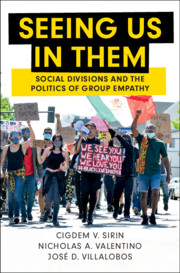Book contents
- Seeing Us in Them
- Cambridge Studies in Public Opinion and Political Psychology
- Seeing Us in Them
- Copyright page
- Dedication
- Contents
- Figures
- Tables
- Prologue
- 1 The Puzzle
- 2 Group Empathy Theory
- 3 Measuring Group Empathy
- 4 An Origin Story
- 5 Group Empathy and Homeland Security
- 6 Group Empathy and the Politics of Immigration
- 7 Group Empathy and Foreign Policy
- 8 Group Empathy in the Era of Trump
- 9 Group Empathy, Brexit, and Public Opinion in the United Kingdom
- 10 Cultivating Group Empathy and Challenging Ethnonationalist Politics
- Epilogue Group Empathy in Response to the COVID-19 Pandemic
- References
- Index
- Books in the series
Epilogue - Group Empathy in Response to the COVID-19 Pandemic
Published online by Cambridge University Press: 11 March 2021
- Seeing Us in Them
- Cambridge Studies in Public Opinion and Political Psychology
- Seeing Us in Them
- Copyright page
- Dedication
- Contents
- Figures
- Tables
- Prologue
- 1 The Puzzle
- 2 Group Empathy Theory
- 3 Measuring Group Empathy
- 4 An Origin Story
- 5 Group Empathy and Homeland Security
- 6 Group Empathy and the Politics of Immigration
- 7 Group Empathy and Foreign Policy
- 8 Group Empathy in the Era of Trump
- 9 Group Empathy, Brexit, and Public Opinion in the United Kingdom
- 10 Cultivating Group Empathy and Challenging Ethnonationalist Politics
- Epilogue Group Empathy in Response to the COVID-19 Pandemic
- References
- Index
- Books in the series
Summary
The book ends with an epilogue on the COVID-19 pandemic that upended the world, causing massive loss of life and socio-economic devastation, as we were finishing our book. We present empirical evidence from our latest national survey in March 2020 on the role group empathy plays in reactions to the pandemic. Group empathy is the leading predictor of support for coronavirus-related foreign aid, above and beyond partisanship, ideology, feelings about whites versus blacks, political news exposure, and other key factors. As a discriminant validity check, we also analyzed the effect of group empathy on concern about oneself or a family member getting ill with the coronavirus disease. The results corroborate that the effect of group empathy we observe on support for coronavirus relief to foreign nations is not a product of concern about the COVID-19 pandemic getting worse elsewhere and eventually coming back to infect the respondents themselves. It is about concern for others. Further consistent with our theory, the association between group empathy and support for coronavirus-related foreign aid is much stronger among nonwhites as compared to whites. We conclude with a discussion about the power of empathy to improve intergroup relations in the post–COVID-19 world.
Keywords
- Type
- Chapter
- Information
- Seeing Us in ThemSocial Divisions and the Politics of Group Empathy, pp. 260 - 265Publisher: Cambridge University PressPrint publication year: 2021

